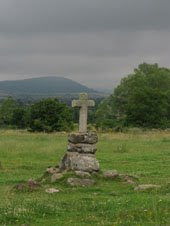 Around a bottle of burgundy and a meal refreshingly full of vegetables and fruit, the Mariani family teased us about our route. "The Aveyron is empty; there's nothing there. You want to go via Burgundy. It's where the French make wine with their souls not just their pockets!"
Around a bottle of burgundy and a meal refreshingly full of vegetables and fruit, the Mariani family teased us about our route. "The Aveyron is empty; there's nothing there. You want to go via Burgundy. It's where the French make wine with their souls not just their pockets!"
Earlier in the day we had crossed into our second French region, from Normandy to Picardy. "Normandy, it's clear: it's apples and camembert, thatched cottages and calvados," David challenged them, "but what is Picardy?"
There was a confused silence. "Beh! Nothing! Picardy has nothing." And these were Picardy people. A fortnight later, Jaqueline Dru in La Forestière in Cessières took issue with that. "Non, non, non - ça m'enerve quand on dit ça!" She produced a charming book of old Picardy recipes. "Picardy is Ficelle Picard - a rolled pancake with ham, mushrooms, leeks and creamy sauce. It is Marouille cheese and the little pyramid cheeses dipped in pimento. It is Champignons de Paris and pork with leeks ..."
We came across the champignons de Paris - aka button mushrooms - where they are grown in old stone quarry caves around Soissons. Marouille cheese we had eaten melted as the stuffing of baby marrows and creamy as the sauce with a pork cutlet. And we ate it again for breakfast as we listened to Jacqueline, raw so we could taste its sharp crumbliness that disappears into sweet creaminess when it is cooked. And we've seen leeks aplenty in allotment gardens.
To us, Picardy is also the stone villages of the Soissonais area, pretty and well-tended and calling to mind the affluent grey Oxfordshire Cotswolds. Their gables, old and new, on every building from  Mairie to dog kennel are of stepped stone blocks, serrating the sky and known as "monks' staircases".
Mairie to dog kennel are of stepped stone blocks, serrating the sky and known as "monks' staircases".
Picardy is the department of the Oise with its wealth revealed in the big and royal or 'small' and bourgeois chateaux. It is the beautiful thoroughbred racehorses and the wide sandy tracks they ride on, meeting at white signposts that section the forests like a game of Chinese Chequers. It is money, and endless open fields, made larger and ever larger to drive that money; and it is mud and wind across the plains and it is rain. It is echos of the Great War and the trenches in those open, muddy fields, on our cold and lonely afternoons.  5 March 2008
5 March 2008
Thursday, 13 March 2008
Picardy who?
Posted by
Rachel Escott
at
12:35
![]()





































































No comments:
Post a Comment